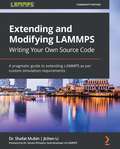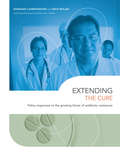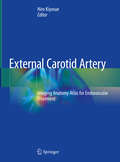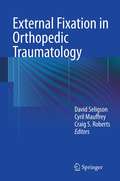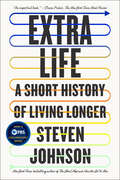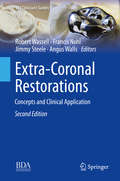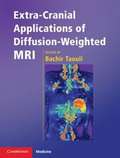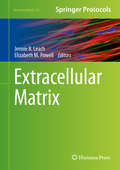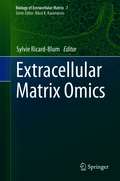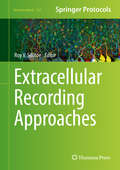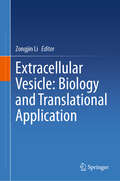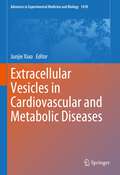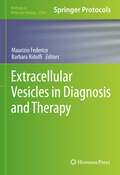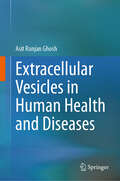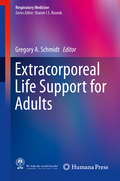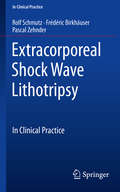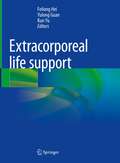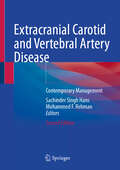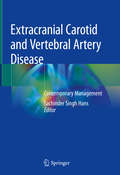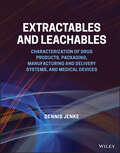- Table View
- List View
Extending and Modifying LAMMPS Writing Your Own Source Code: A pragmatic guide to extending LAMMPS as per custom simulation requirements
by Dr. Shafat Mubin Jichen Li Dr. Steven PlimptonUnderstand the LAMMPS source code and modify it to meet your research needs, and run simulations for bespoke applications involving forces, thermostats, pair potentials and more with easeKey FeaturesUnderstand the structure of the LAMMPS source codeImplement custom features in the LAMMPS source code to meet your research needsRun example simulations involving forces, thermostats, and pair potentials based on implemented featuresBook DescriptionLAMMPS is one of the most widely used tools for running simulations for research in molecular dynamics. While the tool itself is fairly easy to use, more often than not you'll need to customize it to meet your specific simulation requirements. Extending and Modifying LAMMPS bridges this learning gap and helps you achieve this by writing custom code to add new features to LAMMPS source code. Written by ardent supporters of LAMMPS, this practical guide will enable you to extend the capabilities of LAMMPS with the help of step-by-step explanations of essential concepts, practical examples, and self-assessment questions. This LAMMPS book provides a hands-on approach to implementing associated methodologies that will get you up and running and productive in no time. You'll begin with a short introduction to the internal mechanisms of LAMMPS, and gradually transition to an overview of the source code along with a tutorial on modifying it. As you advance, you'll understand the structure, syntax, and organization of LAMMPS source code, and be able to write your own source code extensions to LAMMPS that implement features beyond the ones available in standard downloadable versions. By the end of this book, you'll have learned how to add your own extensions and modifications to the LAMMPS source code that can implement features that suit your simulation requirements.What you will learnIdentify how LAMMPS input script commands are parsed within the source codeUnderstand the architecture of the source codeRelate source code elements to simulated quantitiesLearn how stored quantities are accessed within the source codeExplore the mechanisms controlling pair styles, computes, and fixesModify the source code to implement custom features in LAMMPSWho this book is forThis book is for students, faculty members, and researchers who are currently using LAMMPS or considering switching to LAMMPS, have a basic knowledge of how to use LAMMPS, and are looking to extend LAMMPS source code for research purposes. This book is not a tutorial on using LAMMPS or writing LAMMPS scripts, and it is assumed that the reader is comfortable with the basic LAMMPS syntax. The book is geared toward users with little to no experience in source code editing. Familiarity with C++ programming is helpful but not necessary.
Extending the Cure: Policy Responses to the Growing Threat of Antibiotic Resistance
by David L. Smith Ramanan Professor Laxminarayan Anup Professor Malani David Professor HowardOur ability to treat common bacterial infections with antibiotics goes back only 65 years. However, the authors of this report make it clear that sustaining a supply of effective and affordable antibiotics cannot be without changes to the incentives facing patients, physicians, hospitals, insurers, and pharmaceutical manufacturers. In fact, increasing resistance to these drugs is already exacting a terrible price. Every day in the United States, approximately 172 men, women, and children die from infections caused by antibiotic-resistant bacteria in hospitals alone. Beyond those deaths, antibiotic resistance is costing billions of dollars through prolonged hospital stays and the need for doctors to resort to ever more costly drugs to use as substitute treatments. Extending the Cure presents the problem of antibiotic resistance as a conflict between individual decision makers and their short-term interest and the interest of society as a whole, in both present and future: The effort that doctors make to please each patient by prescribing a drug when it might not be properly indicated, poor monitoring of discharged patients to ensure that they do not transmit drug-resistant pathogens to other persons, excesses in the marketing of new antibiotics, and the broad overuse of antibiotics all contribute to the development and spread of antibiotic-resistant bacteria. The book explores a range of policy options that would encourage patients, health care providers, and managed care organizations to serve as more responsible stewards of existing antibiotics as well as proposals that would give pharmaceutical firms greater incentives to develop new antibiotics and avoid overselling. If the problem continues unaddressed, antibiotic resistance has the potential to derail the health care system and return us to a world where people of all ages routinely die from simple infections. As a basis for future research and a spur to a critically important dialogue, Extending the Cure is a fundamental first step in addressing this public health crisis. The Extending the Cure project is funded in part by the Robert Wood Johnson Foundation through its Pioneer Portfolio.
External Carotid Artery: Imaging Anatomy Atlas for Endovascular Treatment
by Hiro KiyosueThis atlas presents the detailed anatomy of the external carotid arterial branches for interventional radiology. In the last decade, interventional neuroradiology (endovascular treatment via the cerebral arteries) has advanced rapidly thanks to the development of new technological devices, such as detachable coils for brain aneurysm. Anatomical knowledge of the target vessels is essential for interventional neuroradiology, and innovative new imaging techniques like 3D angiography and image fusion techniques can depict the detailed anatomy of small vessels together with surrounding organs. This compilation provides not only 2D angiography images, but also 3D and cross-sectional images, as well as fusion images mainly based on 3D angiography, CT and MRI to further readers’ understanding of the complicated anatomy of the small branches of the external carotid artery. It also describes the branches’ clinical significance in endovascular treatment. The book offers a valuable resource for interventional neuroradiologists, neurosurgeons and neurologists, as well as otolaryngologists, plastic surgeons, radiology technicians, and all medical staff involved in interventional radiology.
External Fixation in Orthopedic Traumatology
by Cyril Mauffrey David Seligson Craig S. RobertsExternal fixation in Orthopedic traumatology is a textbook that focuses on the use of external fixation in the acute management of patients with serious orthopedic injuries. The book highlights the indications for external fixation and provides an evidenced based guide to both the specialist orthopedic surgeon and the trainee. The manuscript is organised in 15 chapters covering the indications and surgical techniques for pelvis, lower limb and upper limb injuries, including detailed illustrations and clinical photographs that will enable the reader to rapidly visualise the structure of the construct and to plan the surgery accordingly. More general topics such as damage control orthopedics, the biomechanics of external fixation and medico-legal considerations surrounding the injured patients are also included to provide an overall picture of the Orthopedic trauma patient. The Combined experience of the editors and authors, their involvement in a number of external fixation system designs and their international reputation in the field contribute to making this textbook an essential tool that should be available to all orthopedic surgeons dealing with injured patients.
Extra Life: A Short History of Living Longer
by Steven JohnsonAs featured in The New York Times Magazine, and on an upcoming PBS documentary series: the surprising and important story of how humans gained what amounts to an extra life, from the bestselling author of How We Got to Now and Where Good Ideas Come From As a species we have doubled our life expectancy in just one hundred years. All the advances of modern life—the medical breakthroughs, the public health institutions, the rising standards of living—have given us each about twenty thousand extra days on average. There are few measures of human progress more astonishing than our increased longevity. This book is Steven Johnson&’s attempt to understand where that progress came from. How many of those extra twenty thousand days came from vaccines, or the decrease in famines, or seatbelts? What are the forces that now keep us alive longer? Behind each breakthrough lies an inspiring story of cooperative innovation, of brilliant thinkers bolstered by strong systems of public support and collaborative networks. But it is not enough simply to remind ourselves that progress is possible. How do we avoid decreases in life expectancy as our public health systems face unprecedented challenges? What current technologies or interventions that could reduce the impact of future crises are we somehow ignoring? A study in how meaningful change happens in society, Extra Life is an ode to the enduring power of common goals and public resources. The most fundamental progress we have experienced over the past few centuries has not come from big corporations or start-ups. It has come, instead, from activists struggling for reform; from university-based and publicly funded scientists sharing their findings open-source-style; and from nonprofit agencies spreading new innovations around the world.
Extra-Coronal Restorations: Concepts and Clinical Application (BDJ Clinician’s Guides)
by Angus Walls Robert Wassell Francis Nohl Jimmy SteeleThis book is a state of the art clinical guide to contemporary materials and techniques for the restoration of individual teeth and implants. It fully reflects the important developments in the field over the past 15 years, including in particular the shift away from wholesale use of crowns towards adhesive dentistry and less invasive extra-coronal restorations. The book opens by considering the principles and evidence base relating to the longevity of restorations of teeth and implants. Importantly, it explains how to ensure “a healthy start” and manage future risks. Material choice and aesthetic issues are then discussed, before all aspects of the planning and provision of extra-coronal restorations are examined in depth. The coverage also includes the adaptation of crowns to existing partial dentures. In line with modern dental education, each chapter begins with clinically relevant learning objectives, and helpful clinical tips are highlighted. The book will be of value for senior dental undergraduates, postgraduates, and practicing dentists and its scientific content will be of interest to dental academics.
Extra-Cranial Applications of Diffusion-Weighted MRI
by Bachir TaouliContinuous improvement in MRI technology in recent years has led to the application of diffusion-weighted MR imaging in organ systems outside the brain. Extra-Cranial Applications of Diffusion-Weighted MRI provides an extensive review of current and future applications of this imaging modality by world-renowned experts. Organized by organ system, each chapter is highly illustrated, offering a balance of protocols, illustrations and principles of image interpretation. An initial chapter provides an overview of relevant physics and other technical details, followed by detailed chapters on all major body systems including liver, kidney, prostate, breast and spine. A final chapter discusses assessment of therapy response. Written and edited by leading DW-MRI experts worldwide, Extra-Cranial Applications of Diffusion-Weighted MRI is an invaluable resource for radiology trainees, practising radiologists and for researchers in a wide variety of disciplines.
Extracellular ATP and adenosine as regulators of endothelial cell function
by Evgenia Gerasimovskaya Elzbieta KaczmarekExtracellular purines and pyrimidines (ATP, ADP, UTP and adenosine) are released into the extracellular milieu in response to a variety of stress conditions and act as important regulators of vascular homeostasis. This new book is uniquely focused on the signaling actions of extracellular purines in endothelial cells and the crucial role of extracellular purines in regulation of angiogenesis, vascular tone, cell permeability, wound healing, inflammation and cell-to-cell communication. This book examines the responses of endothelial cells, originating from various tissues (such as cornea, pancreas and uterus), to extracellular nucleotides and adenosine under physiological and pathological conditions, i.e. pregnancy, hypoxia, hypertension, inflammation and diabetes. In the book's 12 chapters, the role of purinergic signaling in endothelium-dependent tissue perfusion, regulation of endothelial barrier function, and angiogenesis are discussed. The mechanisms of ATP release and its role in intercellular communication are also presented. In addition, the book provides the most up to date mechanisms of extracellular nucleotide metabolism by purine-converting ecto-enzymes and their contribution to purinergic signaling in endothelial cells originating from various vascular beds. This book is a valuable resource for biomedical research scientists, clinical scientists, graduate students and health science professionals interested in the mechanisms of extracellular purine function in endothelial cells under physiologic and pathologic conditions.
Extracellular Fine Particles
by Yoshinobu Baba Rikinari Hanayama Hidetaka Akita Takao YasuiThis open access book elucidates new biological phenomena caused by extracellular fine particles and highlights the development of base technologies for their control. In this book, the latest knowledge is collected on the principles of extracellular fine particles recognition, action, and biological responses. In addition, the base technologies for their detection, separation, measurement, and analysis are discussed. It also presents the treatment of endogenous and exogenous fine particles and analytical methods as well as functions of extracellular fine particles. This book is useful for undergraduate and graduate students engaged in research on extracellular fine particles, academic and corporate researchers, as well as national think tanks and national policy makers to understand the basics and applications of extracellular microparticles.
Extracellular Matrix
by Jennie B. Leach Elizabeth M. PowellThis volume provides comprehensive procedures for analyzing the extracellular matrix in native, injured, and engineered neural tissues. Divided into four parts, each focusing on different aspects of the extracellular matrix and the nervous system, Extracellular Matrix covers methods to analyze native tissue, in vitro models for investigating cell-extracellular matrix interactions in a variety of contexts, protocols to investigate the role of the extracellular matrix in nervous system injury, degeneration, and regeneration, as well as therapeutics and engineered systems. Each chapter is written by leading experts and presents established protocols in a concise format, encompassing current technologies as well as methods developed over years of research. Beginning with an introduction to the method, chapters continue with a listing of the materials and equipment, step-by-step protocols, and a Notes section with troubleshooting tips, supplemental details and alternative approaches, as well as a list of references for further information. As part of the practical and convenient Neuromethods series, Extracellular Matrix serves as an invaluable aid for researchers studying this vital area of neuroscience.
Extracellular Matrix Biomineralization of Dental Tissue Structures (Biology of Extracellular Matrix #10)
by Michel Goldberg Pamela Den BestenThis book addresses the structural and biological properties of dental and peridental tissue structures and covers their mineralization process. The book contains a description of dentines, cementum, enamel and bone, including collagens, as well as non-collagenous proteins (SIBLINGs, SLRPs, GAGs, PGs, lipids, and MMPs). The mechanisms of mineralization are described in detail and the book is focused on matrix vesicles, collagen mineralization and the role of non-collagenous extracellular matrix components either as promoters or inhibitors of mineralization. In addition, the matrix components (non-collagenous) of enamel (amelogenin, ameloblastin, enamelin, MMP4, MMP20 and other proteases) are reviewed and their respective roles in dental tissues biomineralizations and tissue turnover are discussed. Additionally, environmental factors involved in enamel / dentin defects are adressed. With state-of-the-art contributions from experts in the respective domains, the book is a useful introduction to the field for junior scientists, interested in dental and peridental tissue biomineralization. It is also an interesting read for advanced scientists and clinicians working in dental research, giving them a broader view of the topic beyond their area of specialization.The series Biology of Extracellular Matrix is published in collaboration with the American Society for Matrix Biology.
Extracellular Matrix Omics (Biology of Extracellular Matrix #7)
by Sylvie Ricard-BlumThis book covers different omics aspects related to the extracellular matrix (ECM), namely specific omics resources focused on the extracellular matrix (e.g., databases, repositories and atlases), quantitative proteomics applied to specific extracellular matrices (e.g. basement membranes), biological processes such as ECM degradation (degradomics), cell-matrix interactions (adhesomes), signaling pathways, biomarker discovery and diseases, and interactomics (extracellular matrix interaction networks including not only protein-protein but also protein-glycosaminoglycan interactions). The volume also includes recent advances in glycomics and glycobioinformatics applied to proteoglycans and glycosaminoglycans, which are key biological players. The use of omics data to build dynamic models of ECM-regulated biological pathways is addressed, together with the requirement to standardize omic data, which is a prerequisite for the FAIR (Findability, Accessibility, Interoperability, and Reusability) guiding principles for scientific data management.This book will be of great interest to a broad readership from beginners to advanced researchers, who are interested in extracellular matrix omics and will inspire future research topics.
Extracellular Recording Approaches
by Roy V. SillitoeThis volume presents techniques and recently developments in extracellular recording. The chapters in this book explore topics such as mouse, rat and zebrafish models; extracellular recordings on human cognition; single-unit recordings and multi-electrode arrays; and recordings in perinatal and early developing mice. In Neuromethods series style, chapters include the kind of detail and key advice from the specialists needed to get successful results in your laboratory.Cutting-edge and authoritative, Extracellular Recording Approaches is a valuable resource that provides readers with up-to-date applications and methods to study brain regions involved in sensory, motor, and cognitive functions.
Extracellular Vesicle: Biology and Translational Application
by Zongjin LiThis book focuses on the applications of extracellular vesicles (EVs) for regenerative medicine. EVs are small, lipid-bound vesicles carrying cargo that can be released by virtually all cell types. Over the past decades, the field of EV research has experienced exponential growth. Once dismissed as mere cellular debris, EVs are now recognized as sophisticated messengers, facilitating the transmission of crucial information between cells and orchestrating a myriad of biological processes. Notably, stem cell-derived EVs hold particular promise in regenerative therapeutic applications. Rich in the functional components of stem cells, these EVs offer an alternative approach to cell therapy for tissue repair and regeneration. The purpose of this book is to provide an overview of EVs on their biology, function, and potential applications. The book starts with exploring the intricate biology of EVs, their cargo, and their unique ability to modulate cellular processes. It discusses the therapeutic potential of EVs in various diseases, as well as the approaches for the bionanotechnological development of artificial EVs for theranostics. Large-scale EV isolation methods and their preclinical applications are also addressed. It will be useful for undergraduate and graduate students in medicine and cell biology, biologist, and others who are interested in such topic.
Extracellular Vesicles in Cardiovascular and Metabolic Diseases (Advances in Experimental Medicine and Biology #1418)
by Junjie XiaoThis book provides the latest research progress on Extracellular vesicles (EVs) in cardiovascular and metabolic diseases. EVs are small bilayer lipid membrane vesicles released by cells and function for intercellular communication. Increasing evidence has shown that EVs play crucial roles in cardiovascular and metabolic diseases, which seriously threaten human health worldwide. The book contains four sections: 1) Extraction Methods; 2) EVs in Cardiovascular Diseases; 3) EVs in Metabolic Diseases; and 4) Therapeutic Implications. This book is useful for biologists, cardiologists, cardiovascular surgeons, endocrinologists, internists, nurses, undergraduate and graduate students in medicine and cell biology, and others interested in cardiovascular and metabolic medicine.
Extracellular Vesicles in Diagnosis and Therapy (Methods in Molecular Biology #2504)
by Maurizio Federico Barbara RidolfiThis detailed book provides an exhaustive picture of current methods to detect, isolate, and analyze extracellular vesicles (EVs) from diverse sources, now seen as potential disease biomarkers as well as tools for the development of new therapies. Beginning with a section on detection and isolation of EVs, the volume continues with chapters covering different methods to isolate and quantify EVs from specialized tissues/organs and body fluids, methods devoted to analyzing EV components, as well as cutting-edge methods to engineer EVs. Written for the highly successful Methods in Molecular Biology series, chapters include introductions to their respective topics, lists of the necessary materials and reagents, step-by-step, readily reproducible laboratory protocols, and tips on troubleshooting and avoiding known pitfalls. Authoritative and practical, Extracellular Vesicles in Diagnosis and Therapy serves as an ideal guide for researchers seeking to learn more about the complexities of cell-to-cell communication.
Extracellular Vesicles in Human Health and Diseases
by Asit Ranjan GhoshThis book reviews the physiological and therapeutic applications of extracellular vesicles (EV) of different cell types. The initial chapter of the book focuses on their evolution, physiological functions, inter- and intra-cellular communication, and their strategic applications in defining different health disorders including aging, pathogenicity, toxicity, and drug delivery. The chapter also provides an overview of recent technologies for EV isolation, analysis, and quantification. The chapter also examines the role of EVs in viral and bacterial pathogenesis and discusses the emerging potential of EVs as diagnostic and therapeutic tools. It also discusses the emerging role of EVs including endosome-derived exosomes and fragments of the cellular plasma membrane in intercellular communication by transporting messenger RNA, microRNA (miRNA), and proteins. The book further explores the potential of membrane vesicles in the prevention, diagnosis, and treatment of inflammatory diseases,metabolic disorders, cardiovascular diseases, and neurodegenerative disorders. This book address researchers, clinicians, and doctoral and graduate students working in cellular molecular biology, cancer biology, infectious diseases, molecular medicine, biomedicine, neurobiology, microbiology, and translational medicine.
Extracellular Vesicles: From Bench to Bedside
by Qian Wang Lei ZhengThis book aims to provide a comprehensive and systematic understanding of research on extracellular vesicles (EVs). Extracellular vesicles, including exosomes and microvesicles, are nano-sized lipid bilayer encapsulated membranes carrying proteins, lipids, nucleic acids. They are shed by the majority of the cells into the extracellular milieu and present in many biological fluids (blood, urine, saliva, breast milk, cerebrospinal fluid, follicular fluid, semen, lung lavage, and tears). With numerous research publications in recent years, the study of EVs is the emerging field across plenty of disciplines. Many researches and efforts have shown their biogenesis, multiple roles in physiological and pathophysiological processes, and their potential roles as therapeutic agents. The book is organized by outstanding scientists in EV field from the Chinese Society for Extracellular Vesicle (CSEV). It covers the biological basic research of EVs, especially on technologies and methods, as well as the clinical application of EVs as biomarkers for disease diagnosis and therapy.
Extracorporeal Life Support for Adults
by Gregory A. SchmidtThis book presents a concise, evidence-based review of extracorporeal life support (ECLS) for adult diseases. It describes the use of ECLS with patients who are experiencing severe hypoxemic respiratory failure (ARDS and pneumonia), ventilatory failure (status asthmaticus and COPD), cardiogenic shock and circulatory or gas exchange failure following complications in cardiothoracic surgery, as well as its use as a bridge to lung transplant. Historically, clinicians have used ECLS as a last resort; however, this text details the technological improvements, evidence of improved outcomes and adverse consequences of alternative treatments that are causing this modality to be more commonly adopted. Topics include a description of the complex physiology and technology underlying ECLS; the evidence base for its use in specific clinical conditions; vascular access techniques; daily management of the circuit and patient; guidance regarding the weaning and decannulation process and recommendations for crisis management and rehabilitation related to ECLS. Extracorporeal Life Support for Adults is ideal reading for practicing physicians, nurses, perfusion specialists, therapists and critical care trainees who are considering whether to refer their patients for ECLS or are already providing ECLS and are seeking a practical reference to best practices and updated information.
Extracorporeal Membrane Oxygenation for Adults (Respiratory Medicine)
by Gregory A. SchmidtThis new edition presents an evidence-based review of extracorporeal membrane oxygenation (ECMO) for adults, with a particular focus on veno-venous (VV) ECMO. Due to the dramatic impact of COVID-19, the number of institutions offering ECMO, thus the number of clinicians performing ECMO (or referring their patients for ECMO), has exploded in a truly unprecedented way. While the pandemic may fade, programs built in response will survive by extending the application of ECMO to previously overlooked populations.This fully updated second edition refines its focus to VV ECMO, which has seen the most dramatic increase and relevance. This allows expert authors to go further in depth regarding VV ECMO and provide readers with better guidance from the physiology of VV ECMO to weaning and decannulation. Several areas have been expanded, including anti-thrombotic approaches; how to set the mechanical ventilator and judge the complex interactions between patient, ventilator, and ECMO circuit; assessing the systemic circulation during VV ECMO (especially right ventricular function and intravascular volume); and recognizing membrane lung dysfunction. Finally, new chapters addressing how the VV-capable clinician should think about VA ECMO and how to incorporate ethical principles in patient selection and withdrawal of ECMO have been added.This is an ideal guide for intensive care and respiratory medicine specialists, fellows training in critical care, ECMO specialist staff, perfusionists, nurses, and respiratory therapists.
Extracorporeal Shock Wave Lithotripsy: In Clinical Practice (In Clinical Practice)
by Rolf Schmutz Frédéric Birkhäuser Pascal ZehnderThis book is a comprehensive guide to extracorporeal stone wave lithotripsy (ESWL) that includes a step-by-step approach for treating every possible kidney stone position. The book has an easy to read structure that will help readers understand ESWL quickly.Written by leading experts who have used ESWL to treat over 23000 patients, this book brings together years of practical knowledge and expertise in one concise volume. The book aims to utilise this knowledge and allow people to independently carry out kidney stone treatment on patients. Diagrams and illustrations show the methods and techniques needed in ESWL, as well as the potential complications.
Extracorporeal life support
by Kun Yu Feilong Hei Yulong GuanThis book covers up-to-date knowledge of extracorporeal life support/ membrane oxygenation (ECLS/ECMO), which is performed as one special procedure that takes over the work of the lungs when they are too sick to properly support the body. ECLS has been recognized as one primary rescue strategy when the conventional treatments cannot reverse the process of cardiac dysfunction or respiratory dysfunction. During the recent years, ECLS has also been utilized as the bridge during peioperative organ transplantation, emergency cardiopulmonary resuscitation, and chronic assistant devices such as left ventricular assist device.This book summarizes the major characteristics of technique, current status of implication and topics of development. Physiology and mechanism of ECLS is defined in the initial part of the book. Type and primary characteristics of ECLS, including instrument materials and monitoring methods are further introduced. Methods of cannulation, characteristics of patients and key-point of management during pediatric ECLS are included. ECLS has been recognized as one kind of novel CPR procedures, transport of ECLS, treatment of various complications with preventive strategy are demonstrated. Recent hot topics of ECLS and training perspective are also discussed.
Extracranial Carotid and Vertebral Artery Disease: Contemporary Management
by Sachinder Singh Hans Mohammed F. RehmanAcute stroke care has improved significantly during the last 10-20 years, starting with IV TPA to transfemoral carotid stenting, TCAR and large vessel thrombectomy. Large vessel thrombectomy is performed in more stroke cases within a few hours of stroke to salvage the brain tissue from the effect of acute ischemia. This text is designed to be a comprehensive and state-of-the art approach to managing straightforward to complex arterial reconstructions. In the second edition of this book, chapters from the first edition have been revised and updated with contributions from new authors, and a number of new chapters for management of stroke have been added. Each chapter dealing with clinical pathology addresses patient selection, preoperative considerations, technical steps for operation and emphasis on avoiding complications. Management of common complications related to each procedure is outlined in a step-wise fashion. Pertinent case material is presented in brief at the end of the chapters, and plentiful figures, illustrations and review questions help the reader in grasping the technique of a particular procedure.
Extracranial Carotid and Vertebral Artery Disease: Contemporary Management
by Sachinder Singh HansManagement of carotid and vertebral artery disease has undergone tremendous strides since the introduction of thin section CT angiography and neurointerventions. These minimally invasive techniques continue to evolve allowing great advantages for patients. In this book we will focus on both endovascular (minimally invasive) and open arterial reconstructions as both types of procedures are still very much part of routine practice in managing extracranial carotid and vertebral artery disease.This text is designed to be a comprehensive and state-of-the art approach in managing straight forward to complex arterial reconstructions. Sections will focus on carotid/vertebral anatomy, physiology, diagnostic modalities. Subsequent chapters will focus on specific disease processes and their management with best medical therapy neurointerventions (carotid artery stenting) and open reconstructions like carotid endarterectomy and arterial reconstructions for vertebral artery disease. In addition, management of extracranial carotid artery aneurysms, carotid body tumors and carotid trauma will be covered in detail. Modern techniques in rehabilitation practice for stroke patients will also be addressed. The authors will be recognized experts in their field, whether an acknowledged academic leader or a well respected community based surgeon. Each chapter dealing with clinical pathology will address patient selection, preoperative considerations, technical steps for operation and emphasis on avoiding complications. Management of common complications related to each procedure will be outlined in a step-wise fashion. Pertinent case illustrations will be described in short at the end of the chapter. Figures and illustrations will help the reader in grasping the technique of a particular procedure.
Extractables and Leachables: Characterization of Drug Products, Packaging, Manufacturing and Delivery Systems, and Medical Devices
by Dennis JenkeEXTRACTABLES AND LEACHABLES Learn to address the safety aspects of packaged drug products and medical devices Pharmaceutical drug products and medical devices are expected to be effective and safe to use. This includes minimizing patient, user or product exposure to impurities leached from these items when the drug product is administered or when the medical device is used. Clearly, patient or user exposure to leachables must not adversely impact their health and safety. Furthermore, these impurities must not adversely affect key quality attributes of the drug product or medical device, including its manufacturability, stability, efficacy, appearance, shelf-life and conformance to standards. Extractables and leachables are derived from the drug product’s packaging, manufacturing systems and/or delivery systems or from the medical device’s materials of construction. It is imperative to understand and quantify the release of extractables from these items, the accumulation of leachables in drug products and the release of leachables from medical devices. Once extractables and leachables have been discovered, identified and quantified, their effect on the key product or device quality attributes, including safety, must be systematically and scientifically established according to recognized, rigorous and relevant regulatory and compendial standards and industry-driven best practices. In Extractables and Leachables, the chemical compatibility (including safe use) of drugs (and their containers, delivery devices and manufacturing systems) and medical devices is examined at length, focusing particularly on how trace-level extractables and leachables affect the quality and safety of a medical product and how to assess the magnitude of the effect. This is accomplished by addressing the two critical activities required to develop, register and commercialize safe, effective and affordable clinical therapies; measuring extractables and leachables (chemical characterization) and assessing their impact (for example, toxicological safety risk assessment). Each of these activities is addressed in-depth, based on the existing and developing international regulations and guidelines, current published literature and the author’s extensive personal experience. Written by a key contributor to standards, guidelines, recommended practices and the scientific literature, the book provides “insider” insights beyond those gained by merely reading the relevant texts. Given that the rapidly evolving extractables and leachables landscape, this book provides the most current and crucial information on new and forthcoming regulations and best practices. Extractables and Leachables readers will also find: A thorough summary of regulatory and compendial guidelines and the steps required to meet them A detailed and in-depth review of essential scientific principles and recommended best practices for the design, implementation, interpretation and reporting of chemical characterization studies A practical resource for optimizing the development, registration, and commercialization of safe and effective medical products A helpful tool to maximize product development and successful regulatory outcomes Extractables and Leachables is the essential reference for pharmaceutical scientists, analytical chemists, regulatory affairs professionals, engineers, and toxicologists in areas such as product research and development, product registration and approval, regulatory affairs, analytical science, quality control, and manufacturing.
